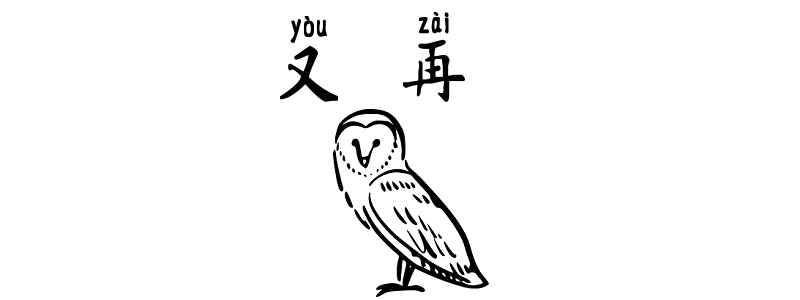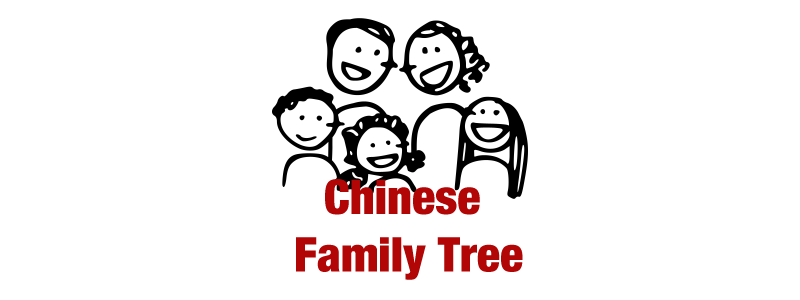Grammar Point:The word 重新 chóngxīn in Chinese can be translated to “again,” “anew,” or “re-” in English. It is often used to indicate the repetition or renewal of an action or state. Structure S + 重新 chóngxīn + V 請qǐng重新chóngxīn啟動qǐdòng電腦diànnǎo请qǐng重新chóngxīn启动qǐdòng电脑diànnǎoPlease restart the computer. 忘掉wàngdiào過去guòqù, 我們wǒmen重新chóngxīn開始kāishǐ好hǎo嗎ma? 忘掉wàngdiào过去guòqù, 我们wǒmen重新chóngxīn开始kāishǐ好hǎo吗ma? Can we start over and forget the past?…
Author: tiffany
“Again” in Chinese Grammar
Grammar Point:Both 再 zài and 又 yòu indicate the repetition of the same action and can be translated to “again” in English. However, 又 yòu is used when the repeated action has happened again and there is often a 了 le at the end of the sentence. In contrast, 再 zài is used when the…
“Only” in Chinese 2
Grammar Point:In Chinese, “only” can be translated using different words depending on the context. Two common translations for “only” are 光 guāng and 僅僅仅仅 jǐnjǐn. Structure S + guāng + V + O or Complement It can be used in both formal and casual situations. 他tā光guāng吃chī肉ròu, 一點yìdiǎn蔬菜shūcài也yě不吃bùchī他tā光guāng吃chī肉ròu, 一点yìdiǎn蔬菜shūcài也yě不吃bùchīHe only eats meat, he doesn’t eat any…
Emphasizing a negation – bìng
Grammar Point:In Chinese, the word 並并 bìng is used to emphasize a negation. It’s often used in conjunction with negative words like 不 bù or 沒 méi to strengthen the negative meaning. Structure People use 並并 bìng to indicate that what they are saying is contrary to what the addressee assumes or expects. It adds…
“Moreover” in Chinese 1 – bìngqiě
Grammar Point:並并且 bìngqiě can be used to connect two verbs. In this structure the two verbs may be of equal importance, but it emphasizes the progression of ideas and adds a layer of “moreover” or “furthermore” to the sentence. Structure Verb Phrase + 並并且 + Verb Phrase When 並并且 bìngqiě is used to link verb…
“In addition” in Chinese – lìngwài
Grammar Point:The term 另外 lìngwài is commonly used in Chinese to mean “in addition,” “furthermore,” “another,” “other,” or “besides.” It is used to introduce additional information or points in a sentence. Structure 另外 lìngwài is a transitional phrase, used to smoothly introduce additional information or ideas. Its placement in the sentence can vary, but it…
Living Room Vocabulary
But if we’re only discussing vocabulary, it could be a bit dull, don’t you think? Let’s spice it up by incorporating some Fengshui concepts! These principles are rooted in Fengshui beliefs and aim to create a harmonious home environment. It’s important to remember that Fengshui is a personal practice, and different Fengshui practitioners may have…
Need in Chinese – xūyào
Grammar Point:需要 xūyào is an auxiliary verb in Chinese that means “to need” or “to require.” It’s used to indicate a necessity or a requirement for something. Structure S + 需要 xūyào + (MW) + N 我wǒ需要xūyào一個yíge男朋友nánpéngyǒu我wǒ需要xūyào一个yíge男朋友nánpéngyouI need a boyfriend. 她tā需要xūyào多少錢duōshǎoqián? 她tā需要xūyào多少钱duōshǎoqián? How much money does she need? 她tā需要xūyào很多hěnduō錢qián她tā需要xūyào很多hěnduō钱qiánShe needs a lot of money. 你nǐ需要xūyào更gèng多duō時間shíjiān嗎ma?…
Chinese Grammar – nándào
Grammar Point:難难道 nándào is a grammatical expression used in Chinese to convey a sense of rhetorical questioning or disbelief within a statement. It is often translated as “could it be that” or “is it possible that” in English. It’s used when you’re kind of asking a question, but you already know or expect the answer….
The Chinese Family Tree
Family Grandparents Dad’s side Mum’s side Using the character 外 wài in Chinese shows “outside” in talking about family members highlights how families used to be mostly focused on the father’s side in the past. This was common due to the way families were organized. However, things change over time. In Taiwan, younger people seem…









